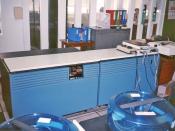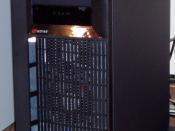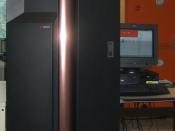Mainframe computer
A 1990 Honeywell-Bull DPS 7 mainframe CPU
Mainframes (often colloquially referred to as big iron) are large and "expensive" computers used mainly by government institutions and large companies for mission critical applications, typically bulk data processing such as censuses, industry/consumer statistics, ERP, and bank transaction processing.
The term during the early 1970s with the introduction of smaller, less complex computers such as the DEC PDP series, which became known as minicomputers or just minis. The industry/users then coined the term "mainframe" to describe larger, earlier types (previously known simply as "computers").
Description
Modern mainframe computers' abilities are not so much defined by their performance capabilities as for their high-quality internal engineering and resulting proven reliability, "expensive" but high-quality technical support, top-notch security, and strict backward compatibility for older software. These machines can and do run successfully for years without interruption, with repairs taking place whilst they continue to run.
Mainframe vendors offer such services as off-site redundancy -- if a machine does break down, the vendor offers the option to run customers' applications on their own machines (often without users even noticing the change) whilst repairs go on.
Mainframes often support thousands of simultaneous users who gain access through "dumb" terminals or terminal emulation. Early mainframes either supported this timesharing mode or operated in batch mode where users had no direct access to the computing service, it solely providing back office functions. At this time mainframes were so called because of their very substantial size and requirements for specialized HVAC and electrical power. Nowadays mainframes support access via any user interface, including the Web. Blade servers rather than mainframes are now increasingly requiring "exotic" cooling technologies.
Market context
Nearly all mainframes have the ability to run (or "host") multiple operating systems and thereby operate not as a single...


